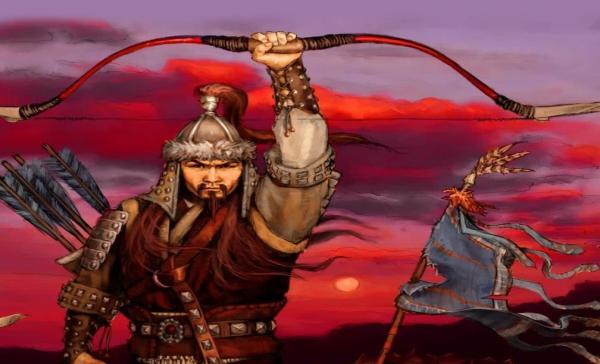There are very few historical records about Kublai, but it is mentioned in the "New Yuan History of Kublai" that he belonged to the Baruch clan and also belonged to one of the Mongol tribes, and he was the same as the world-famous Genghis Khan. Kublai has loved riding and shooting since he was a child, and the warriors in the Mongolian steppe are all riding archers, and Kublai is of course one of the outstanding. Kublai had come to train his strength and military ability, and he hoped that in the future he would be able to stand out and do some vigorous deeds. Kublai often envisioned a life of fighting and fighting like his Mongol ancestors in order to give full play to his talents. As Genghis Khan's fame spread throughout the steppe, the young Kublai invited his brothers to join genghis Khan. This coincided with the frequent wars of the Mongol steppe tribes, and Kublai served as a general of Genghis Khan to take the lead for him. Kublai was so brave that he followed Genghis Khan to wipe out one powerful tribe after another in the steppe, allowing the Mongol Beggars to dominate the vast steppe.

In 1189 AD, Temujin (known as Genghis Khan) was eager to be called Khan after many military achievements. But fearing that several other strong competitors in the Mongols would fail due to competition, Temujin hoped that someone would publicly support him. When Kublai was annoyed by Temujin, he and his brother openly stood up in support of Temujin. In this way, Temujin, with the strong support of everyone, defeated the few Khan contenders. In order to thank Kublai for his help, Temujin sealed Kubilai as a sword-carrying guard under his account, and placed high hopes on him. In 1202 AD, the leaders of the steppe nomadic nobles in the Mongol provinces, Kucha'er and Altan, blatantly violated military orders and looted property during the battle. This violated Temujin's previous stipulation that the wartime battle would be fought bravely and that the goods would be distributed equally among the soldiers after the war. Since Kucha'er and Altan did not pay any attention to Temujin, the Great Khan, Temujin was very annoyed, and he sent Kubi to punish the disobedient Kucha'er and Altan.
Kublai did things vigorously and meticulously. He wanted to establish authority for Temujin Khan, who led a force directly to the camp where Kucha'er was located. Kublai completely disregarded the status of the so-called "noble" Mongols, and he only faithfully carried out Temujin's orders. Kublai ordered the men to take all the property that Kucha'er had robbed during the war, and asked them to reflect on themselves! After the looted possessions were taken away, Kucha'er and Altan, although very angry in their hearts, were suffering from Temujin's power and prestige, and they did not dare to do anything with Kublai! Kublai taught Kucha'er and Altan a good lesson, so that they would no longer dare to be arrogant in front of Temujin. This strengthens Temujin's Khan authority! In 1204 AD, the arrogant Lord of the Naiman Clan, Sun Khan, sent out a message to destroy the rising Mongols, and When Temujin knew about it, he had to take it seriously. Temujin decided to preemptively attack the Naimans in order to completely eliminate the Naibans.
For the sake of safety, Temujin carefully considered his selection of vanguard generals. Kublai and the "Four Heroes" were appointed by Temujin as the vanguard general, and Temujin sent him to suppress the Naimanbu. Kublai fought like a wind, and his bravery shocked all the soldiers of the Naimanbu and made the Naiman soldiers frightened. Kublai led the vanguard to defeat the Naimanbu in a short period of time, achieving great military achievements, and Temujin praised him. In 1206 AD, Temujin created a new and vigorous Great Mongol Khanate. Temujin appointed Kublai as his head of the thousand households, and entrusted the military affairs of the Khanate to Kubilai's general manager. It can be seen how much Trust Temujin trusts Kublai. Kublai became one of the ten most well-deserved heroes of the Great Mongol Empire, and he and his people le contempt, Tetsubetsu, and Subutai were called Temujin's "four mastiffs". After that, Temujin sent Kubbi on an expedition to Haararubu near the Tianshan Mountains. Kublai forced Halarube to surrender to the Mongols in 1211 AD.
Kublai had suffered from illnesses long ago, both good and bad. He thought that his illness was not very serious, so he fought with the disease for many years. This made his body chronically ill, and it became more and more serious later. In 1211, after Kublai's successful conquest of Haralup, his condition suddenly exploded and worsened. After his class returned to the Mongolian steppe, he fell ill. Genghis Khan saw that Kublai was seriously ill and was very worried about him. Genghis Khan visited Kublai's tent many times and told him to recuperate. Kublai knew that time was short, and it wasn't long before Kublai fell ill and died. Kublai, a famous general of the Mongol Empire, was not killed by any enemies on the battlefield, but was eventually killed by disease. When Genghis Khan learned of Kublai's death, he was deeply saddened! The knife-wielding bodyguard closest to him also left him.